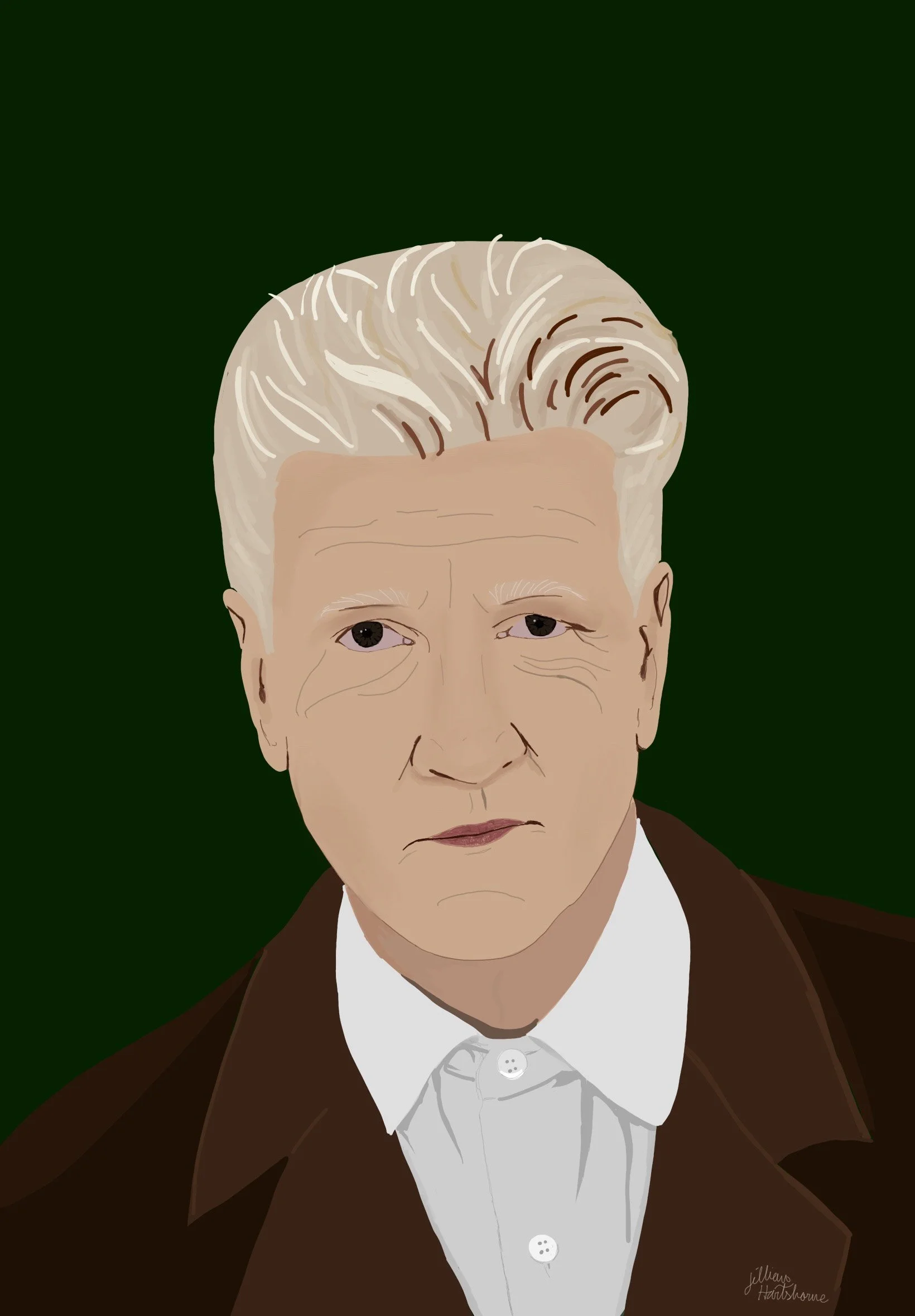Wild at Heart and Weird on Top: Remembering David Lynch
Article By: Krubel Berhe / Graphic By: Jillian Hartshorne
How do you describe an artist like David Lynch? Someone whose influence has greatly impacted almost every single medium. Why did so many artists and celebrities share their grief when he passed away on January 16, 2025? Do people only remember him because he was that weird guy who made those movies and shows that didn’t make sense? What makes this guy so special? Let’s look at why this man has had a chock hold on pop culture and the arts, and why his passing touched the souls of millions.
To start, unlike most artists, David Lynch had the world around his finger from the very start. When his directorial debut “Eraserhead” was released in 1977 it changed the film landscape as we knew it. Released amid The New Hollywood Movement which invigorated up-and-coming filmmakers to make more audacious and unconventional films, Lynch made well on that promise. At the time, no one had seen a film of that nature. Something that didn’t explain itself, but rather was a vessel for the audience to have their own interpretation of it. Its impact is still being felt to this day and revolutionized the medium both visually and audibly. Its surrealist view on the nuclear family, parenthood, and industry completely revamped the concept of contemporary cinema. After the release of Eraserhead, Lynch went on to gain massive critical and commercial successes with his follow-ups Elephant Man, Blue Velvet, and Wild At Heart, even going as far as winning the Palme d’Or for Wild At Heart. However, none of these match the seismic earthquake left by Lynch’s magnum opus, his defining work, the groundbreaking Twin Peaks.
To call Twin Peaks a game-changer would be the understatement of the millennium. Before Twin Peaks, TV wasn’t taken seriously and looked down upon as only able to tell sitcoms and monster-of-the-week style shows. The opening shot of a murdered teenage girl wrapped in plastic washed up on shore demolished that reputation forever. TV had never been that violent, especially towards a woman and definitively not towards a kid. Within the opening moments of the show, Lynch broke the constructs of what TV could be and offered the mystery of a lifetime: Who killed Laura Palmer? The nationwide chock hold this mystery held has tried to be imitated for the last 30 years by several other shows, but has never been replicated quite like Twin Peaks did. Another large portion of Twin Peaks staying power comes from its surrealist visual and audible style. After blowing audiences away with the showstopping pilot episode, Lynch and Mark Frost went bigger and bolder in the follow-up episode. In the final moments of the episode, Dale Cooper falls into a dream-like state and stumbles upon a red room and a man speaking in reverse. If the first episode hit audiences like a hammer to the face, then the follow-up is a gunshot to the head. Despite all the strangeness that Twin Peaks is known for, at its core it’s a show about love and the fight between good and evil. Its enticing mystery and lovable cast of characters left an impact on TV that can’t be understated. Without Twin Peaks, there’s no Sopranos, Breaking Bad, or BoJack Horseman. It was the first modern television show and showed just how powerful this medium can be when done properly. However, there’s something about Lynch’s works that plays a big part in what made him such a revolutionary artist, and that key factor is in the way he writes women.
Since the start of his career, Lynch has always made a point to show how women are often exploited for sexual purposes, but he also writes them in a way that makes them more than the indignant acts committed towards them. He writes these characters in a way that showcases all of their complexities and internal conflicts, but he humanizes them in such a delicate and beautiful way. There’s always such a vigorous emotional intensity in these characters that’s shown in the writing and the performances themselves. These beautiful women are faced with horrific circumstances such as addiction and sexual abuse, but he always showed how they’re so much more than their scars. Take the titular David Lynch character, Laura Palmer, for example. We are gradually shown how this picture-perfect prom queen was suffering from rape, substance abuse, and self-loathing. However, we are shown her ferocious spirit when she protects her best friend from the same men who have been taking advantage of her for years. And when she eventually dies, the angels grant her peace for showing such raw courage when faced with death. Lynch has always been very blunt with his feminist views in his films, and that’s part of the reason so many loved him.
Lynch saw things in people that they didn’t see in themselves. It’s because of this that he introduced the world to award-winning actors such as Laura Dern and Kyle MacLachlan. Lynch revitalized people’s perception of what art can be. He was such an enigmatic artist and yet our most human one too. He represented such a strong ideology of artistic integrity that is vacant in most major productions today, and that is a huge part as to why people mourned his death so heavily. His passing signified an emptiness that has been in Hollywood for a very long time. However, his art and passion will forever live on in those who were impacted by it, and the fire that burned so brightly from his ingenuity will never be extinguished.
